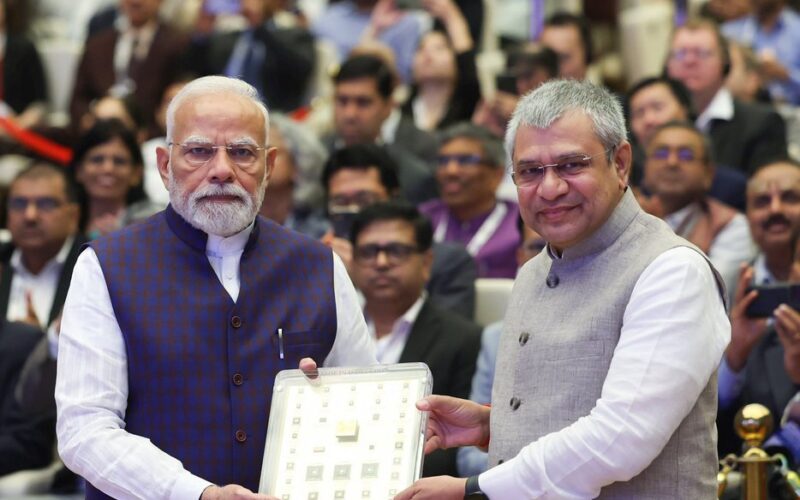#MadeInIndia #SemiconIndia2025 #IndiaSemiconductorMission #TechLeadership #ViksitBharat2047 #DigitalIndia #ElectronicsManufacturing #DeepTech #Innovation #CleanEnergy #Quantum #GlobalHub
New Delhi: India’s semiconductor journey entered a historic new phase today as the first set of Made-in-India chips from a pilot production line were presented to Prime Minister Shri Narendra Modi by Union Minister for Electronics and Information Technology, Shri Ashwini Vaishnaw, during the Semicon India 2025 conference.
Describing the achievement as a “moment of pride”, Shri Vaishnaw thanked the Prime Minister for his farsighted vision, strong will and decisive action that have propelled India from policy approvals to production within just three and a half years of launching the India Semiconductor Mission (ISM) in December 2021.
He added that with GDP growth of 7.8% and the successful delivery of India’s first indigenous chips, Bharat stands as a lighthouse of stability and resilience in an uncertain global economic landscape.
Building India’s Semiconductor Ecosystem
The Minister emphasized that India’s semiconductor mission is anchored in trust, intellectual property protection, robust supply chain development, and co-development partnerships with global leaders. Unlike some nations, he noted, India has always approached the world as a partner for mutual growth, a factor that has given the country a strong edge in the global semiconductor value chain.
From 7.8% GDP growth to a growing semiconductor ecosystem with 1st ‘Made in India’ chips — Bharat stands as a lighthouse of stability. pic.twitter.com/bIUz5cCZUH
— Ashwini Vaishnaw (@AshwiniVaishnaw) September 2, 2025
At Semicon India 2025, a total of 12 Memorandums of Understanding (MoUs) were signed, targeting key areas such as:
-
Development of indigenous capabilities in product design
-
Manufacturing of camera modules, MEMS microphones, and advanced packaging
-
Talent development initiatives to strengthen India’s human capital for the chip industry
Deep Tech Alliance with $1 Billion Commitment
In a major announcement, Shri Vaishnaw launched the Deep Tech Alliance, with nearly $1 billion in committed funding. Initially, the Alliance will focus on semiconductors but will gradually expand into frontier areas like clean energy, biotechnology, quantum computing, and space technologies.
This initiative is expected to provide critical venture capital support to India’s deep tech ecosystem, helping startups and research institutions bridge the gap from lab to market.
ISM 2.0: From Ecosystem to Products
The Minister also revealed plans for ISM 2.0, which will shift the focus from building infrastructure to developing India into a “product nation”.
The first phase, ISM 1.0, concentrated on creating a robust foundation of fabs, OSATs (Outsourced Semiconductor Assembly and Testing), capital equipment, and materials. With these in place, ISM 2.0 will support indigenous product design, IP creation, and export competitiveness.
He also noted that India’s semiconductor production is already 15–30% more cost-competitive than global benchmarks, underscoring the country’s advantage in manufacturing efficiency.
International Confidence in India’s Chip Mission
Semicon India 2025 saw the participation of major global industry leaders including ASML, Lam Research, Applied Materials, Merck, and Tokyo Electron. Their presence, Shri Vaishnaw said, demonstrates the strong confidence the global semiconductor ecosystem places in India’s mission, spearheaded under the leadership of Prime Minister Modi.
Talent and Student Innovations
A unique highlight of the event was the presentation of 20 chips designed and manufactured by Indian students at the Semiconductor Laboratory (SCL), Mohali to the Prime Minister.
With 78 universities now equipped with advanced Electronic Design Automation (EDA) tools, India is nurturing a talent pool that already accounts for nearly 20% of the global semiconductor workforce. Shri Vaishnaw highlighted that talent development and innovation remain the heart of ISM’s strategy, ensuring long-term leadership.
Strengthening the Startup and Design Ecosystem
India’s Design Linked Incentive (DLI) scheme is gaining momentum, with over 28 startups progressing from project stage to product stage. Recent MoUs cover areas such as IoT chipsets, automotive camera systems, and microcontrollers, while premier institutes like IIT Madras have already released indigenous processors.
The government has identified 25 priority products for accelerated development under the DLI, aimed at creating a strong portfolio of homegrown IPs that can power global innovations.
MoUs and Announcements at Semicon India 2025
Key collaborations announced include:
-
Tata Electronics & Merck: Strengthening semiconductor manufacturing and packaging capabilities
-
Tata Electronics & C-DAC: Building a domestic design and IP ecosystem
-
Kaynes Semicon: Launching India’s first fully localized automotive camera module and MEMS microphone solutions
-
L&T Semiconductor with IIT Gandhinagar & IISc Bangalore: Developing a secure chip for e-passports and a National Innovation Hub for quantum research
-
C-DAC & Indiesemic: Unveiling India’s first IoT Evolution Board with indigenous VEGA processor
-
NIELIT & SSIA (Singapore): Promoting semiconductor skilling and academia-industry linkages
-
Arizona State University & ISM: Establishing scientific and educational collaborations
These partnerships are expected to accelerate India’s self-reliance while boosting global collaborations.
Towards a $1 Trillion Industry by 2030
With semiconductors projected to become a USD 1 trillion global industry by 2030, India is positioning itself as a key hub by leveraging its strengths in talent, trust, and technology.
The Union Minister reaffirmed that India’s approach — professional assessments, deliberate approvals, and strong execution — ensures that the country is not just catching up, but setting new standards for sustainable growth in semiconductors.
Conclusion
From being import-dependent to producing its first indigenous chips, India has achieved in just 3.5 years what many thought would take decades. The unveiling of the first “Made-in-India” chips symbolizes not just technological progress, but also India’s resolve to become a global semiconductor powerhouse.
With a strong foundation laid by ISM 1.0, bold vision under ISM 2.0, and growing international confidence, India is on track to deliver on the Prime Minister’s vision of making the nation the semiconductor hub of the world.
Hashtags
#MadeInIndia #SemiconIndia2025 #IndiaSemiconductorMission #TechLeadership #ViksitBharat2047 #DigitalIndia #ElectronicsManufacturing #DeepTech #Innovation #CleanEnergy #Quantum #GlobalHub

